A rapid form of consolidation in skill learning (Current Biology, 2019)
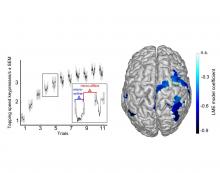
Here, we looked at the within-seconds time course of early human procedural learning over alternating short periods of practice and rest that constitute a typical early online training session (left hand side). We found that performance did not markedly change over short periods of practice. On the other hand, performance improvements in between practice periods - when subjects were at rest - were significant and accounted for early procedural learning. These offline improvements were more prominent in early training trials when the learning curve was steep and no performance decrements during preceding practice periods were present. At the neural level, simultaneous magnetoencephalographic (MEG) recordings showed an anatomically defined signature of this phenomenon (right hand side). Beta band brain oscillatory activity in a predominantly contralateral fronto-parietal network predicted rest-period performance improvements. Thus, we report a rapid form of offline consolidation that substantially contributes to early skill learning and may extend the concept of consolidation to a time scale in the order of seconds, rather than the hours or days traditionally accepted.
Mechanisms of offline motor learning at a microscale of seconds in large-scaled crowdsourced data (Nature Sci Learning, 2020)
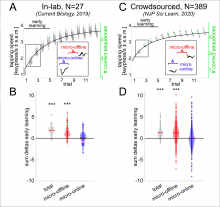
Performance improvements during early human motor skill learning are driven by performance improvements during rest. To reveal the mechanisms behind these "micro-offline" gains, we leveraged the sampling power offered by online crowdsourcing (cumulative N over all experiments = 951). First, we replicated the original in-lab findings, demonstrating generalizability to subjects learning the task in their daily living environment (N = 389). Second, we showed that offline improvements during rest are equivalent when significantly shortening practice period duration, thus confirming that they are not a result of recovery from performance fatigue (N = 118). Third, retroactive interference immediately after each practice period reduced the learning rate relative to interference after passage of time (N = 373), indicating stabilization of the motor memory at a microscale of several seconds. Finally, we showed that random termination of practice periods did not impact offline gains, ruling out a contribution of predictive motor slowing (N = 71). Altogether, these results demonstrated that micro-offline gains indicate rapid, within-seconds consolidation accounting for early skill learning.
Consolidation of human skill linked to waking hippocampo-neocortical replay (Cell Reports, 2021)
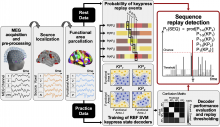
How the brain binds sequences of discrete action representations into consolidated, temporally precise skills during waking rest is still not known. Given what is known about neural replay and its role in systems consolidation, we set out to test waking replay as a candidate mechanism for these micro-offline gains – a form of rapid skill consolidation. We recorded whole-brain MEG while naïve participants learned a novel keypress sequence by typing it as fast and accurate as possible over several 10s practice blocks interleaved with 10s rest periods. We developed and trained SVM classifiers on practice MEG to decode individual finger keypresses, and then applied a simple probabilistic model coupled with resampling to search for replay of the practiced sequences over different durations (i.e. - temporal compression factors).
Immediately following the onset of practice, we detected on average about 25 replay events of completed practice sequences – a 3-fold increase compared to pre-training rest. The modal duration of these replay events was 50ms – representing 20x temporal compression of the practiced sequence. Replay of the skill memory was characterized by strong covariations of source power within a network including the sensorimotor cortex, precuneus, entorhinal cortex and hippocampus. The increase in replay appeared to be selective for the practiced sequence, as changes in replay rates were not observed for a control sequence with zero ordinal and transitional overlap. Importantly, the number of replay events were directly related to the magnitude of micro-offline gains observed in individuals, leading us to conclude that waking hippocampo-neocortical replay is a likely binding mechanism supporting rapid skill memory consolidation.
Phase-dependent offline enhancement of human motor memory (Brain Stimulation, 2021)
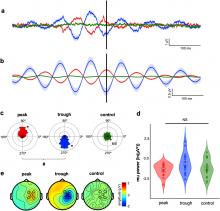
Skill learning engages offline activity in the primary motor cortex (M1), which exhibits mu (8-12 Hz) rhythm activity oscillations defined by excitatory trough and inhibitory peak phases. While we recently showed that the magnitude and direction of neuroplasticity induction within M1 is influenced by mu phase, the relationship with human skill learning has not been investigated. Here, we evaluated the effects of phase-dependent TMS applied during mu peak and trough phases on overnight offline learning of a newly-acquired motor skill. This study was conducted in healthy adults over two days . On Day 1, three groups of participants practiced an explicit motor sequence learning task with their non-dominant left hand. Following practice, real phase-dependent TMS was applied to the right M1 during either mu peak (Group 1)or trough (Group 2) phases. An additional group received sham TMS during random mu phases (Group 3). On Day 2, all participants were re-tested on the same task to evaluate overnight offline learning. We found that participants who received phase-dependent TMS during mu trough phases (Group 2) showed increased overnight offline skill learning compared to those who received phase-dependent TMS during mu peak phases (Group 1) or sham TMS during random mu phases (Group 3). Mu trough-phase TMS also elicited stronger whole-brain broadband oscillatory power responses than phase-dependent mu peak-phaseTMS. Based upon these findings, we conclude that sensorimotor mu trough phases reflect brief windows of opportunity during which applied TMS can enhance the potentiation of newly-acquired skill memories.
Combined low-frequency brain oscillatory activity and behavior predict future errors in human motor skill (Current Biology, 2023)
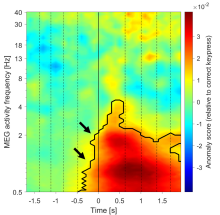
Human skills are composed of sequences of individual actions performed with utmost precision. When occasional errors occur, they may have serious consequences, for example, when pilots are manually landing a plane or when surgens perform robotic surgery. In such cases, the ability to predict an error before it occurs would clearly be advantageous. Here, we asked whether it is possible to predict future errors in a keyboard procedural human motor skill. We report that slower speed, and anomalous delta-band oscillatory activity in cingulate-entorhinal-precuneus brain regions precede upcoming errors in skill. Combined anomalous low-frequency activity and slow speed predicted up to 70% of future errors. Decoding strength increased progressively approaching the errors. We conclude that it is possible to predict future individual errors in skill sequential performance.
Generalization of procedural motor sequence learning after a single practice trial (Nature Sci Learning, 2023)
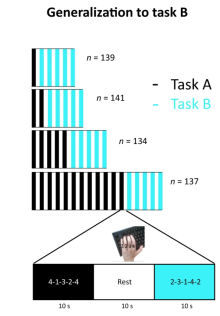
When humans begin learning new motor skills, they typically display early rapid performance improvements. Here, we investigated factors influencing generalization of early learning to a new skill. Early skill generalization was tested over four experiments (N = 2095). Subjects successively learned two related motor sequence skills (skills A and B) over different practice schedules. Skill A and B sequences shared ordinal (i.e., matching keypress locations), transitional (i.e., ordered keypress pairs), parsing rule (i.e., distinct sequence events like repeated keypresses that can be used as a breakpoint for segmenting the sequence into smaller units) structures, or possessed no structure similarities. We identified generalization of shared parsing rule structure between skills A and B after only a single 10-second practice trial of skill A. This generalization was not explained by stronger sensorimotor mapping between individual keypress actions and their symbolic representations. In contrast, learning from skill A did not generalize to skill B during early learning when the sequences shared only ordinal or transitional structure features. These results document sequence structure that can be very rapidly generalized during initial learning to facilitate generalization of skill.
